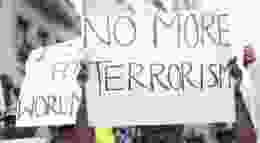
The International Criminal Court must not ignore Nigerian Christian genocide
The International Criminal Court is failing to defend the human rights abuses that are taking place in Nigeria. It continues to be overlooked, despite the death of 100,000 Christians since 2000. This cannot go on, writes Ayo Adedoyin, Chief Executive of PSJ UK.
Recently the President of the International Criminal Court (ICC), the Nigerian Judge Chile Eboe-Osuji, visited the Vatican to meet with Pope Francis.
The meeting gave the ICC the opportunity to present their work defending human rights amid some of the harshest abuses humanity has faced, taking place right now on our planet. It should have also been a prime opportunity to raise a major issue rarely touched upon by the mainstream media: the plight of persecuted Christians around the world.
The job of the International Criminal Court should be to try the world's worst international crimes. But as recently as 2019, the US President attacked the institution as illegitimate. John Bolton, then US National Security Adviser, said in September 2018: "We will provide no assistance to the ICC. We will not join the ICC. We will let the ICC die on its own". The US has now moved to sanction the ICC's chief, including travel bans preventing them from entering the US.
Harsh words and actions, no doubt. But a look at the track record of this global Court gives little cause for mobilising a groundswell of global support.
So far the ICC, whose job is to investigate and try international crimes of genocide, crimes against humanity, war crimes and aggression, has opened twelve investigations, which represent the highest form of scrutiny. Nigeria is at the next level down, where preliminary examinations are being carried out. Yet this year is Nigeria's tenth consecutive year on the case 'waiting list'. One begins to wonder whether the ICC and its Nigerian President have lost all interest in Africa's largest economy and hotbed of Islamist terrorism.
Perhaps Mr Eboe-Osuji and ICC's fellow African prosecutor, Fatou Bensouda should consider PSJ UK's latest warning about the state of Nigeria and West Africa. Following ICON's revelation that almost 100,000 Nigerians, mostly vulnerable Christians, have been slaughtered by Islamists since the year 2000, a fresh ComRes poll from Britain showed a staggering 58 per cent support for imposing sanctions on those individuals responsible.
The UN and the Nigerian government are the bodies seen as most likely to speak out (49 per cent each) and take action (44 per cent and 51 per cent, respectively) against violence against Christians in Nigeria. The ICC's role in supporting the UN to deliver this popular move cannot be side-lined.
The UK APPG on International Freedom of Religion or Belief documented in a report from June 2020 numerous accounts where Christian pastors and community heads are specifically targeted. During many of the attacks, herders are reported by survivors to have shouted 'Allah u Akbar', 'destroy the infidels' and 'wipe out the infidels.' Hundreds of churches have been destroyed, including over 500 churches in Benue State.
Some of the worst-affected areas include Benue, Plateau, Taraba, Adamawa, Kaduna, Kwara, Borno and Zamfara. On 4 July 2018, the Nigerian House of Representatives declared killings in predominantly Christian villages in Plateau State to be a genocide and called on the Federal Government to immediately establish orphanages in areas affected by violence. If there is a genocide, admitted even by Nigeria's legislature, then surely there must be a perpetrator to bring to justice.
De facto ignorance of – or worse, collusion in – the threat posed to innocent Nigerians by Boko Haram, militant Fulani and Islamic State West Africa, as is now taking place among Nigeria's leaders with a 'Responsibility to Protect', must be condemned internationally – especially by the court of last resort. Democratic Republic of the Congo, Uganda, Central African Republic, Sudan and Kenya have seen dozens of indictments by the ICC. Why is the Court so silent on Nigeria? If 100,000 murders is not enough for the Court's investigation team, what is?
The same ICON evidence referred to above found that 20,995 incidents of terrorism occurred in Nigeria since the year 2000. Between 2000-2019, deaths resulting from Fulani Militant attacks include 17,284 across Nigeria and 13,079 in Northern states with significant Christian populations (Benue, Kaduna, Plateau, and Taraba). It has been deduced that possibly three of every four Fulani Militant victims during this time were Christians. The sad reality is that such violence has become so commonplace that it is now the norm. Nigeria's leaders are failing to protect their citizens, one of the key reasons they are elected in the first place.
If the ICC is to re-establish its credibility and fulfil the original intentions of the Rome statute, both the Nigerian Government and the various groups terrorising Nigerian must enter the dock at The Hague to have true justice served. Islamist factions that rule the north and Central Belt of Nigeria in all but name, as well as any state governors permitting their rule or participating in it, and even members of the overseeing Federal Government, must be held accountable. Securing justice for Africa's largest economy and breadbasket of the future will have serious positive implications for the continent, and the world.
In a global context, the International Court has a powerful role to prevent further social deterioration attributed to Islamist expansion in the Sahel. Crimes against the most vulnerable citizens happening in Nigeria are therefore of international concern. Each second the Court waits and ponders, seeking yet another page of tragic evidence or procrastinating in the name of complementarity, innocent lives are lost. Ten years on a waiting list is far too long when matters of life or death come into play.
It is high time that Nigeria's genocide of Christians was pushed to the top of the agenda, for Africa and the world.













